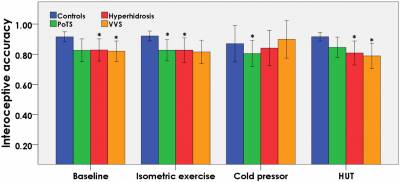
Interoceptive accuracy during supine baseline, isometric exercise, cold pressor and head up tilt (HUT) vs controls. PoTS = postural tachycardia syndrome; EH = essential hyperhidrosis, VVS = vasovagal syncope*
Evaluation and treatment of autonomic disorders including detailed laboratory testing of cardiovascular autonomic function
The autonomic nervous system is important for controlling automatic functions of the body, such as regulation of sweating, blood pressure, heart rate, bowel, bladder and sexual function. We focus on evaluation and treatment of cardiovascular autonomic symptoms.
Conditions and symptoms: Autonomic failure, Multiple system atrophy, Autonomic neuropathy, Autonomically mediated syncope, Orthostatic hypotension, Orthostatic intolerance, Postural tachycardia syndrome, Holmes Adie syndrome, Anhidrosis - Hyperhidrosis, Familial Dysautonomia, Autonomic dysreflexia.
Research Team
- Dr Valeria Iodice
- Dr Ellen Merete Hagen
- Dr Gordon Ingle
- Dr Ekawat Vichayanrat
- Dr Junie Koay
- Dr Fernanda Da Silva
Research Goals
- To improve early diagnosis in neurodegenerative disorders including MSA, PD, PAF (Pure Autonomic Failure).
- To examine central autonomic nervous system function and hypothalamus model in patients with neurodegeneration, with major focus on alpha synucleinopathies.
- To investigate autonomic dysfunction in Transthyretin Familial Amyloid Polyneuropathy (TTR-FAP).
- To examine autonomic neuropsychophysiology in frontal temporal dementia phenotypes.
- To integrate theoretical neurobiology with clinical autonomic testing, psychophysiology and neuropsychology testing to formally examine how interoception and the autonomic nervous system interact to (fail to) maintain homeostasis in healthy controls, dysautonomic, psychiatric and neurodevelopmental disorders.
- To elucidate how sympathetic and parasympathetic dysfunction interacts with neuropsychiatric symptomatology in autism spectrum disorder.
- To examine whether combined neuropsychological, psychophysiological and autonomic testing differs between familial and sporadic Parkinson’s disease.
- To investigate autonomic dysfunction in patients with familial dysautonomia
- To investigate autonomic dysfunction in patients with spinal cord Injury
Funded Research Projects
- Early diagnosis in neurodegenerative disorders including MSA, PD, PAF (Pure Autonomic Failure). Funded by the Italian Ministry of Health.
- Impairment of hypothalamus growth hormone response to clonidine stimulation test as early markers of autonomic dysfunction in neurodegeneration.
- Autonomic dysfunction in Transthyretin Familial Amyloid Polyneuropathy (TTR-FAP). Funded by Pfizer
- Psychophysiological differentiation of frontotemporal dementia phenotypes.
- Recent Publications from Autonomics
2020
Panicker JN, Simeoni S, Miki Y, Batla A, Iodice V, Holton JL, Sakakibara R, Warner TT. Early presentation of urinary retention in multiple system atrophy: can the disease begin in the sacral spinal cord? J Neurol, online 1st March 2020
2016
Owens AP, Low DA, Iodice V, Critchley HD, Mathias CJ. The genesis and presentation of anxiety in disorders of autonomic over excitation. Autonomic Neuroscience 2017; 203:81-87 doi: 10.1016/j.autneu.2016.10.004. Epub 2016 Oct 19.
Owens A, Low DA, Iodice V, Mathias CJ, Critchley HD. Emotion and the autonomic nervous system – a ‘two-way street’: insights from autonomic affective and dissociative disorders. Reference module. Neuroscience and Biobehavioral Psychology, in press. doi.org/10.1016/B978-0-12-809324-5.01799-5
Ponnusamy V, Owens AP, Purkayastha S, Iodice V, Mathias CJ. Orthostatic intolerance and autonomic dysfunction following bariatric surgery: A retrospective study and review of the literature. Autonomic Neuroscience: basic and clinical 2016; 198:1-7 doi.org/10.1016/j.autneu.2016.05.003
Owens AP, David AS, Low DA, Mathias CJ, Sierra-Siegert M. Abnormal cardiovascular sympathetic and parasympathetic responses to physical and emotional stimuli in depersonalization disorder. Frontiers in Neuroscience 9, 26 March 2015 doi.org/10.3389/fnins.2015.00089
Eccles JA, Owens AP, Mathias CJ, Umeda S, Critchley HD. Neurovisceral phenotypes in the expression of psychiatric symptoms. Frontiers in Neuroscience 9, 10 February 2015 doi:10.3389/fnins.2015.00004
Further information
*Owens et al. (2017) The genesis and presentation of anxiety in disorders of autonomic overexcitation. Autonomic Neuroscience Volume 203, March 2017, Pages 81-87. https://doi.org/10.1016/j.autneu.2016.10.004
 Close
Close

